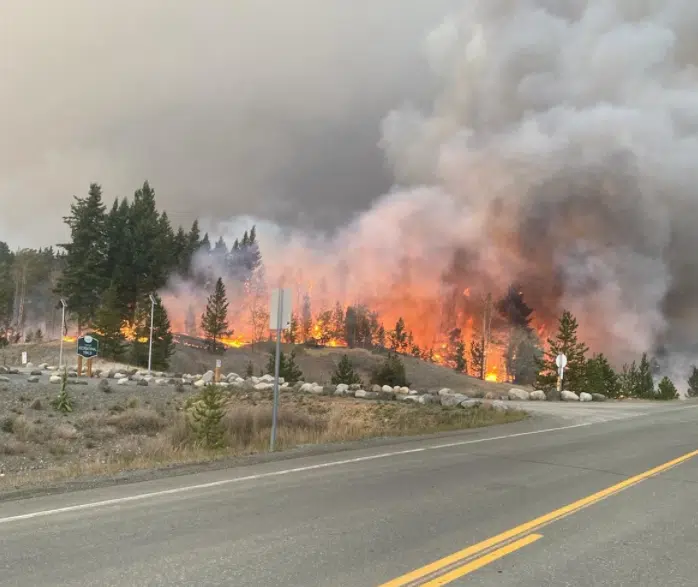
The Tremont Creek wildfire burning directly besides Highway 97D in Logan Lake on Aug 14, 2021. (Photo: Logan Lake Fire Rescue)
The fire chief in Logan Lake says people in the community of about 2,000 people are still on edge given the wildfire situation.
Speaking on the NL Morning News, Doug Wilson said while the Tremont Creek Fire is currently being held, he is not letting his guard down.
“We are constantly checking over our shoulders. There is still a lot of unburned fuel up in the back there if it decides to come back on us,” he said.
“A lot of residents understandably are on edge. The moment we see a puff of smoke, generally, I get a phone call and we’ll go out and check it out and make sure it is nothing. But there is going to be a lot of smouldering I think until the first heavy snowfall.”
Mayor Robin Smith said last week that her community saw the benefits of 18 years of FireSmart work as no structures were lost, even when the 635-square-kilometre fire burned into Logan Lake’s municipal boundaries earlier this month.
“Anything you do, you need a little luck in. And so it was a lot of hard work, that little bit of luck, and here we are today with residents able to come home,” Wilson said, noting the fire did come within 30 feet of one home.
“We did have it all sprinklered. There were additional sprinklers put out with the structural protection units that showed up in town. We ran sprinklers and hoses down the back of people’s properties guarding them from the crown land, and saturated as best we could. In my opinion, it definitely was a factor.”
Ranchers impacted by loss of land due to wildfires: BC Wildfire Service
While structure losses were almost completely avoided near Logan Lake, there were significant losses for certain property owners.
BC Wildfire Service incident commander Hugh Murdoch was on the front lines of the Tremont Creek Fire, and told NL News the impact to ranchers is not lost on him or his crew.
“It is worth noting that at Tunkwa Lake, the structure protection folks and the BC Wildfire Service crews had crews success there too,” he said. “There were outbuildings that were impacted by the fire but the ranching community were also impacted. They suffered tremendous losses on this fire, and other fires.”
Murdoch said fuel mitigation work around Logan Lake made efforts by ground and air crews much more effective when the fire started to close in on the town.
“The were large portions where that guard was, and planes were dropping retardant, in areas that were treated by the community of Logan Lake as part of their FireSmart initiatives,” he added. “So, there were forested areas that got completely burned over and then [when the fire got to] an area that was treated, fire behaviour became far less active.
“They were able to work really quickly over a long strip of ground for several hours. But the space that they had to work in was getting smaller and smaller as that fire was closing in on Logan Lake with considerable speed.”
The Tremont Creek fire was first discovered on July 12, southeast of Ashcroft, growing in size for weeks before rain and cooler temperatures in the past couple of weeks began to reduce fire activity. The fire is now “being held.”
– With files from Colton Davies
















